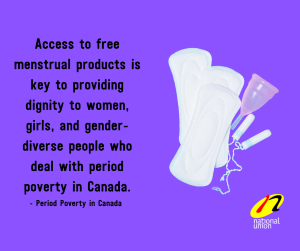This is an archive of news stories and research from the National Union of Public and General Employees. Please see our new site - https://nupge.ca - for the most current information.
We must provide dignity to women, girls, and gender-diverse people who deal with period poverty in Canada instead of furthering the taboos that have plagued this issue for centuries.

Ottawa (09 March 2022) — The National Union of Public and General Employees (NUPGE) and its Advisory Committee on Women’s Issues have been raising awareness for years about women and girls facing period poverty in Canada.
People who menstruate spend a great deal of money on the products they need, like tampons, pads, liners, and menstrual cups. And the cost of those products continues to increase. Some people simply can’t afford to buy these products or in sufficient quantities. This is referred to as period poverty.
Period Poverty in Canada
NUPGE has released a paper entitled Period Poverty in Canada, which examines the economic, health and emotional issues associated with having a menstrual cycle. Women in Canada continue to suffer the consequences of pay inequity. They continue to pay more than men for basic items such as clothing, dry cleaning, and haircuts, etc. They also continue to be the primary care givers for children, elders, and people with disabilities. These responsibilities come at a cost, both emotionally and financially. Added to this list is the cost associated with having a menstrual cycle.
For women, girls, gender-diverse people, and women who are Black, Indigenous or people of colour (BIPOC) who are living in poverty, in domestic violence shelters, living with disabilities, or experiencing homelessness, the cost of these products can mean that they are forced to choose food over their health. The COVID-19 pandemic has exacerbated the situation as the largest employment losses have been in jobs that are low-wage and precarious which are staffed mostly be females. Women who had already been struggling to afford basic needs such as food have now been placed under more extreme financial stress, which leads to making choices between food, rent, and menstrual products.
Governments have slowly responded to increased pressure
The paper also provides an overview of the responses that the federal and provincial governments have now taken to address the issue after continued pressure by advocates such as unions, women’s organizations, shelter organizations and organizations such as Moon Time Sisters, Period Promise and Tampon Tuesdays.
Over the last 3 years some provinces have provided funds to schools to ensure that free menstrual products are available. Federally, the Minister of Labour’s December 2021 mandate letter included direction to lead the efforts to provide free menstrual products in federally regulated workplaces. And the mandate letter to the Minister for Women and Gender Equality and Youth included direction to create a Menstrual Equity Fund for women’s shelters, not-for-profits, charities, community-based organizations, and youth-led organizations.
Dignity rather than taboos
Working with its Advisory Committee on Women’s Issues, NUPGE will continue to lobby all levels of governments to provide free menstrual products in schools, shelters, community centres, and other public buildings. These products must be available in bathrooms of both sexes to ensure that transgender and non-binary people have access as well.
Canadian governments must realize that what is needed is access to free menstrual products to all persons who need them. This would go a long way to provide dignity to women, girls, and gender-diverse people instead of furthering the taboos that have plagued this issue for centuries.
Read the full report: Period Poverty in Canada
